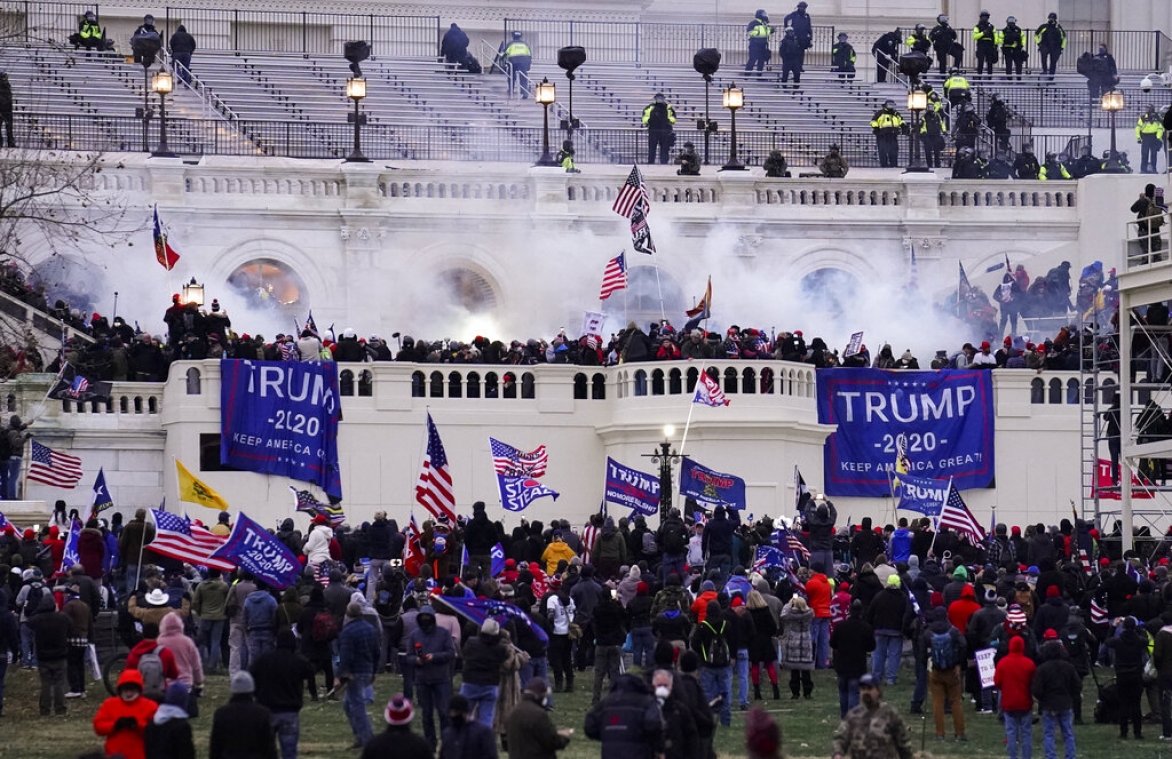Republished by permission from Knight Foundation.
A year ago today (Jan. 6), what started as a protest of the 2020 election certification at Capitol Hill — fueled by misinformation about the legitimacy of our elections system — turned into a violent insurrection. Twitter permanently suspended then-President Donald Trump’s account over the risk of further violence and Facebook later extended its own ban on the former president for two years.
Under the First Amendment, private social media companies have the right to moderate content that violates their rules. But the social giants’ decisions to suspend the former president remain deeply controversial among many Americans. Knight Foundation, in partnership with the polling firm Ipsos, released a study today — on the first anniversary of the insurrection — that illuminates both common ground and divisions when it comes to how Americans view speech rights.
This new Knight-Ipsos survey of more than 4,000 American adults expands on our nearly two decades of student public opinion polling on free speech and First Amendment issues. Free Expression in America Post-2020, part of the Knight Free Expression (KFX) Research Series, represents the most comprehensive public opinion research on free expression available. It also reveals a complex landscape when it comes to speech attitudes in a post-2020 environment.
At a high level, our findings show that most Americans — regardless of race, party or age — overwhelmingly support free speech and expression, recognizing its importance to a healthy democracy. Large majorities also express confidence that the First Amendment protects people like them to a fair degree.
But Americans’ views of high-profile speech events are heavily influenced by their partisan leanings, especially when it comes to politically charged topics such as the insurrection and the spread of COVID-19 misinformation.
The report reveals that:
- Americans overwhelmingly believe entering the Capitol to disrupt the 2020 election certification was not a legitimate expression of First Amendment rights. Just 22% of Americans agreed that this activity was legitimate, with Republicans (33%) far more likely to hold this view than independents (23%) or Democrats (12%).
- Just 30% of Americans believe spreading COVID-19 vaccine misinformation is a legitimate expression of First Amendment rights. But among Republicans, that figure rises to 44%, and it falls to 20% among Democrats. Independents are close to the average at 29%.
- Most Americans (73%) believe people taking part in protests of racial injustice during the summer of 2020 were legitimately expressing their First Amendment rights. A majority of Republicans (56%) agree, though that share is far smaller than independents (75%) or Democrats (85%).
- Most people believe other groups have an easier time exercising their free-speech rights without consequence than they do. For example, Democrats see conservatives as having an easier time, while Republicans believe minority groups, such as black, Hispanic, Asian, or LGBTQ people, have an easier time than whites, conservatives, or people like them.
Partisanship’s influence on the debate over free expression is undoubtedly strong. However, when asked about a non-political event like a student making insulting comments about their high school on social media — as happened last summer when the Supreme Court ruled in favor of a cheerleader who cursed out her school and its cheerleading team online — respondents showed very little partisan differences. A similar majority of Republicans (64%), Democrats (61%) and Independents (64%) agreed that this constituted a legitimate expression of First Amendment rights.
This suggests that when the political hot button disappears, so too does much of the partisan speech divide.
So what should the media, educators and political experts take away from this particular insight, and from our findings more generally?
It’s important to acknowledge that Americans share much common ground on the principles of free speech. At the same time, the partisan contrasts evident in some hotly debated situations demand further reflection on exactly how the principles of the First Amendment are being instilled and discussed in our communities and media. They also highlight the challenges in promoting free expression in a polarized environment where partisans disagree on what speech is acceptable depending on the politics involved, and independents’ views differ widely as well.
Findings further highlight that Americans of color have different experiences and feelings when it comes to speech. Black Americans are far less likely than other groups to express confidence that the First Amendment protects them. They are also less likely than white Americans to believe they can freely use their speech rights without consequence in America today. This should concern anyone who wants to promote speech and expression for all — even as thorny questions remain about how to advance free speech principles while supporting an inclusive society.
At Knight Foundation, we’re committed to advancing the public’s understanding of these challenges. The First Amendment is central to building engaged communities with diverse points of view that a healthy democracy demands.
And there’s more to come in the KFX research series: Later this month, we’ll release our survey of college students’ views of free expression, which have shifted significantly since 2016.
We believe a nuanced understanding of American attitudes towards free expression is critical for policy makers, educators and others grappling with how principles of free speech play out in an increasingly digital, diverse and politically divided America.
We hope the KFX research will provoke discussion and debate about how we protect and promote the values of the First Amendment across the partisan divide, and how free speech helps healthy democracies flourish.
Visit http://kf.org/freespeechrights to see complete findings from the report.
Evette Alexander is director of learning and impact at Knight Foundation.
The Free Speech Center newsletter offers a digest of First Amendment and news media-related news every other week. Subscribe for free here: https://bit.ly/3kG9uiJ

